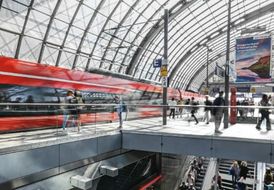Climate-related opportunities and risks
Climate-related transitory opportunities and risks associated with the transition to a decarbonized economy and risks associated with climate change are recorded in our RMS and are reported in the affected risk categories if certain threshold values and probabilities of occurrence are exceeded. As part of RMS and our mid-term planning, climate risks are treated like other risks.
Through the use of scenario analyses, for example as part of the PIK study and the strategic development of climate resilience management, DB Group is paving the way for forward-looking management of acute and chronic physical risks related to climate change. In 2021, we commissioned another external study that identified physical and transitory risks in accordance with the TCFD recommendations in an initial impact analysis on the activities of DB Group for two extreme scenarios. The result shows, among other things, that transitory risks from the political, market and technology categories according to the TCFD classification should be classified as relevant for DB Group.
In the following section, we list examples of climate-related opportunities and risks in accordance with the TCFD classification of transitory and physical opportunities and risks, which are short-term, medium-term and long-term.
- Transitory opportunities and risks: With the Green Transformation of DB Groupµ, its anchoring in our Strong Rail strategy and by a traffic shift to climate-friendly rail, we are making a central contribution to achieving the German and European climate protection targets. At the same time, however, there is also an increased susceptibility to extreme weather conditions and an increased energy requirement, which in turn represents an energy price and procurement risk for us. Making passenger and freight transport climate-neutral through measures such as the use of renewable energies and alternative drive concepts or through robust climate-resilience management can enhance our reputation with our customers. Our climate protection measures aim to reduce our greenhouse gas emissions, to see us become climate-neutral by 2040 and to meet the Federal Government’s climate protection target for the transport sector. In order to achieve the national climate protection targets, the Federal Government is adopting necessary regulations. These hold opportunities for DB Group, especially in rail transport, such as the permanent reduction of value-added tax for long-distance transport tickets. However, individual environmental regulatory measures may also have a negative impact on our activities. The CO₂ price introduced by the Fuel Emissions Trading Act (Brennstoffemissionshandelsgesetz; BEHG) represents, for example, both an opportunity and a risk for us:
- it gives us an opportunity when compared to other modes of transport, as it makes fossil-fueled modes of transport more expensive and thus rail travel more attractive,
- it presents a risk for our purchasing, as we are one of the largest energy consumers in Germany and still have diesel-powered trains in operation.
In order to counteract the risks, we are driving the phase-out of fossil fuels. However, technological developments that lead to other climate-friendly mobility solutions that do not involve rail can also represent a risk for us.
- Physical risks: Extreme weather events resulting from climate change represent an acute physical risk for DB Group, which we have been recording in more detail in our risk catalog since 2021 and which we are responding to with resilience measures. These risks are both short-term and long-term, because they are short-term when they occur, but due to their more frequent occurrence due to climate change, we must take them into account over the long term. We also address physical climate risks as part of our Group-wide business continuity management to ensure the continuation of critical business processes in the event of damage. The consequences of climate change are impacting our core business. Extreme weather-related damage to our track infrastructure can lead to losses in revenues and penalties. It also requires additional expenses and capital expenditures in order to repair damage and implement preventive measures. In addition to the infrastructure, rail and road vehicles can also be affected. In recent years, acute physical risks affecting operations and punctuality have increased significantly. Group Risk Management therefore consistently monitors and records these risks. In this context, the importance of preventive vegetation work and track-related safety work to ensure the smooth running of operations has greatly increased. The potential financial impacts of extreme weather events is taken into account in the RMS or medium-term planning. In order to reduce acute physical risks, DB Group has increased its capital expenditures on vegetation control measures in recent years. Since 2019, the inspection of tree populations has been intensified and a large-scale tree removal measure has been initiated for storm prevention. These measures are additionally funded from the climate protection package. We also deal with chronic physical risks, such as rising temperatures, which place increased demands on our operational processes, vehicles, buildings and infrastructure.


